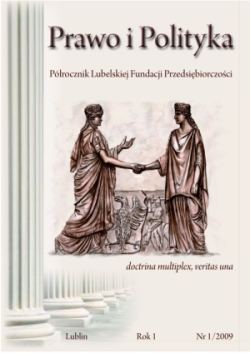Etyka kata w ujęciu porównawczym
The Ethics of the Executioner in a Comparative Perspective
Author(s): Roman TokarczykSubject(s): Criminal Law, Ethics / Practical Philosophy, Penal Policy
Published by: Fundacja Niepodległości
Keywords: judicial executioner; judicial executioner ethics; execution;
Summary/Abstract: According to the dictionary definitions, an executioner is a person employed by justice authorities to carry out judicial sentences of the most severe punishment, i.e. death penalty. Where and when torture was, and even still is admissible, it is also part of the executioner’s duties. Moreover, the principal duties of the executioner also include the de facto already historical penalty of banishing the convicted person from his/her place of current residence. In the broader and colloquial sense of the word, an executioner is also any person who, because s/he torments other people immorally and unlawfully, appears as a brute, tormentor, sadist or torturer. In the present discussion we are concerned exclusively with the executioner as an officer of justice who, in criminal proceedings, performs the functions analogous to those of the court executive officer in civil proceedings. The methods of, instruments for and places where the executioner’s functions are discharged require that he have special knowledge and qualification for the effective and efficient execution of them. Depending on the times and the scope of demand, this led to the emergence of the executioner’s craft, trade, profession or even the office of executioner, which provided the ground for the discussion on the executioner’s ethics as compared with the ethics of other professions, especially with those related to legal professions. /e justification for the discussion on the ethics of the executioner is the existence of the executioner in all those countries in which death penalty (and its execution) is in effect. In this discussion, which is a part of criminal justice ethics, it is necessary to distinguish between the legal grounds for the execution of death penalty and their ethical evaluations that cover the being-in-force of death penalty and the ‘quality’ of its execution. In diversified ethical evaluations, the legal death penalty is found as both moral and immoral. /e acts themselves of execution of death penalty, which are part of the executioner’s qualifications, are also ethically evaluated as moral or immoral. While the ethical evaluations of the being-in-force of the execution of death penalty do not directly belong to the ethics of the executioner, having only an indirect effect on it, this ethics directly covers the executioner’s qualifications or his skill, which previously consisted in inflicting as great physical and mental pain and suffering as possible on the convict before s/he died, and in later periods - in trying to minimize them as much as possible.
Journal: Prawo i Polityka
- Issue Year: 2009
- Issue No: 1
- Page Range: 125-137
- Page Count: 13
- Language: Polish

